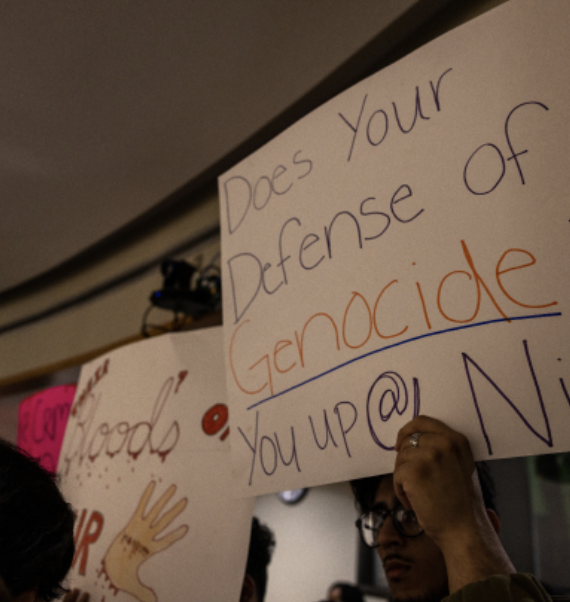Why Elliot Abrams?
Looking into the thick-eyebrow-clad eyes of Elliot Abrams felt nothing like looking into the kind gentle eyes of Angela Davis, who I met about a month ago. February had long passed; clearly, our month was over. Assuming his position at the podium, he sucked all the air out of the room leaving a silent but tense feeling among the crowd. I was sitting among an array of people: curious professors, enraged protestors clad with signs, impartial note-taking students and fiery Abrams supporters. This is not how I saw my Tuesday going. Like many Colgate students, I had not heard of Abrams until recently.
A quick Google search of Elliot Abrams displays his many credentials, including serving as a foreign policy administrator for multiple U.S. presidents and as a senior member of the Council of Foreign Relations. After scrolling through his lengthy credentials, most of the information about Abrams does not paint him well. Coincidentally, he has served under presidents with, in my view, the most controversial foreign policy, which has contributed to numerous violent wars overseas. Furthermore, he was convicted of two misdemeanor counts of withholding information from Congress during the Iran-Contra scandal, which has left an ugly mark on his reputation.
The Iran-Contra scandal is a lengthy, violent moment in US history that spans Abram’s involvement, after which he pled guilty to selling arms to Iran to fund rebel groups that killed hundreds in Nicaragua. This has rightly labeled him to many as a war criminal. As if his reputation couldn’t get any worse, he is an avid supporter of the Iraq War when he served the Bush administration. When we think of all the atrocities committed in Iraq, we think of Bush, not the man (Abrams) lurking in his shadow. Abrams has a controversial reputation that continued into the Trump administration, but it is too expansive to fit into this article.
If we push the war crime aside and just look at his credentials, he is clearly qualified to give a presentation on foreign affairs. Additionally, having such an established member of government on Colgate’s campus was clearly huge for the political science department.
Abrams gave a very brief presentation on the contemporary Middle East and gave some insight into how the U.S. government should conduct itself in this region moving forward. I thought Abrams was very bland speaker; his presentation was fact-based and straight to the point. Still, it was clear that his knowledge of the Middle East is expansive. The biggest highlight of the presentation was his comments on human rights violations. He criticized the Biden administration’s decision to take a step back from overseas involvement and allow human rights violations by authoritarian regimes to continue. This is a slight shift from his perspective in the Bush administration where he championed the “spread of democracy” as the most vital in his foreign policy, which he mentioned during the talk. The mention of human rights by Abrams was laughable to many in the audience given the numerous human rights violations committed by Abrams and the administrations he has served on. While the talk was successful in presenting the challenges of the contemporary Middle East, his “human rights” perspective is just another way for America to justify destabilizing these regions for their own financial benefit.
Associate Professor of Political Science Bruce Rutherford introduced Abrams and explained that his invitation was based on his extensive expertise that can offer an alternative perspective on affairs in the Middle East. It’s not a question that political science thrives on the competition of diverse opinions; the left can not exist without the right and vice versa. But in this situation, while watching Abrams drone on about “human rights,” it’s almost impossible to be impartial and push his history as a war criminal aside. Pushing that aside might be the very problem. Elliott Abrams’ controversial history should be taken into account when considering his presence on campus and here’s why:
Abrams’ human rights perspective on the Middle East is controversial but not groundbreakingly unique to the point that only he could present it. I kept asking myself, “Why him?” It is clear that he is qualified, but given his track record in government, I believe that he shouldn’t be on campus. There are various ways to present this argument. There is a morality issue here that definitely puts Colgate’s political science department under scrutiny. The voices of Black Indigenous people of color, Middle Eastern and Latin American students rang out against Abrams’ invitation but the administration still allowed him on campus. It leaves one to question Colgate’s dedication to its minority students. Still, the argument here is bigger than morality.
The biggest argument against Abrams coming to Colgate is the negative implications of giving him a platform. I want to stress once again his presentation was very brief to the point where it almost seemed insignificant. It was the Q&A portion that was the highlight of Abrams’ visit. Most of the attendees’ questions took personal aim at Abrams and questioned his morals. One of my favorite questions from a protester was: “How can we trust you if you lied to Congress?”
While the protesters made it clear that he wasn’t welcome on our campus, questions like these often worked in Abrams’ favor. By giving him this platform he was able to defend himself and polish the truth about his scandals. He clearly knows a majority of undergraduate students don’t have as much knowledge on America’s conflict in the Middle East to the extent that he does, which he took advantage of when it came time for questioning. Whether or not it was Abrams’ intention for giving the talk, I think the only thing accomplished in Persson Hall was Abrams defending himself. And I don’t think Colgate should give controversial politicians the platform to defend themselves under the guise of presenting on foreign policy, and I think most students would agree with me.










